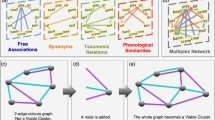Abstract
Bilingual word association networks can be beneficial as a tool in foreign language education because they show relationships among cognate words of different languages and correspond to structures in the mental lexicon. This paper discusses possible technologies that can be used to generate and represent word association networks.
Preview
Unable to display preview. Download preview PDF.
Similar content being viewed by others
References
Barrière, C., St-Jacques, C.: Semantic Context Visualization to Promote Vocabulary Learning. In: Association Computers in the Humanities & Association for Literary and Linguistic Computing Conference, pp. 10–12 (2005)
Ganter, B., Wille, R.: Formal Concept Analysis. In: Mathematical Foundations, Springer, Heidelberg (1999)
Inkpen, D., Frunza, O., Kondrak, G.: Automatic Identification of Cognates and False Friends in French and English. In: RANLP 2005. Proceedings of the International Conference on Recent Advances in Natural Language Processing, pp. 251–257 (2005)
Kiss, G.R., Armstrong, C., Milroy, R., Piper, J.: An associative thesaurus of English and its computer analysis. In: Aitken, A.J., Bailey, R.W., Hamilton-Smith, N. (eds.) The Computer and Literary Studies, University Press, Edinburgh (1973)
Knuth, D.: The Art of Computer Programming Volume 3: Sorting and Searching, 2nd edn. Addison-Wesley Professional, London, UK (1998)
Nelson, D.L., McEvoy, C.L., Schreiber, T.A.: The University of South Florida word association, rhyme, and word fragment norms (1998), Available at http://w3.usf.edu/FreeAssociation/
Miller, G., Beckwith, R., Fellbaum, C., Gross, D., Miller, K.J.: Introduction to WordNet: an on-line lexical database. International Journal of Lexicography 3(4), 235–244 (1990)
Phillips, L.: The Double Metaphone Search Algorithm. C/C++ Users Journal 18(6) (June 2000)
Priss, U., Old, L.J.: Modelling Lexical Databases with Formal Concept Analysis. Journal of Universal Computer Science 10(8), 967–984 (2004)
Peter, R.: Roget’s International Thesaurus, 3rd edn. Thomas Crowell, New York (1962)
Wilson, M.D.: The MRC Psycholinguistic Database:Machine Readable Dictionary. Version 2. Behavioural Research Methods, Instruments and Computers 20(1), 6–11 (1988)
Author information
Authors and Affiliations
Editor information
Rights and permissions
Copyright information
© 2007 Springer-Verlag Berlin Heidelberg
About this paper
Cite this paper
Priss, U., Old, L.J. (2007). Bilingual Word Association Networks. In: Priss, U., Polovina, S., Hill, R. (eds) Conceptual Structures: Knowledge Architectures for Smart Applications. ICCS 2007. Lecture Notes in Computer Science(), vol 4604. Springer, Berlin, Heidelberg. https://doi.org/10.1007/978-3-540-73681-3_23
Download citation
DOI: https://doi.org/10.1007/978-3-540-73681-3_23
Publisher Name: Springer, Berlin, Heidelberg
Print ISBN: 978-3-540-73680-6
Online ISBN: 978-3-540-73681-3
eBook Packages: Computer ScienceComputer Science (R0)




